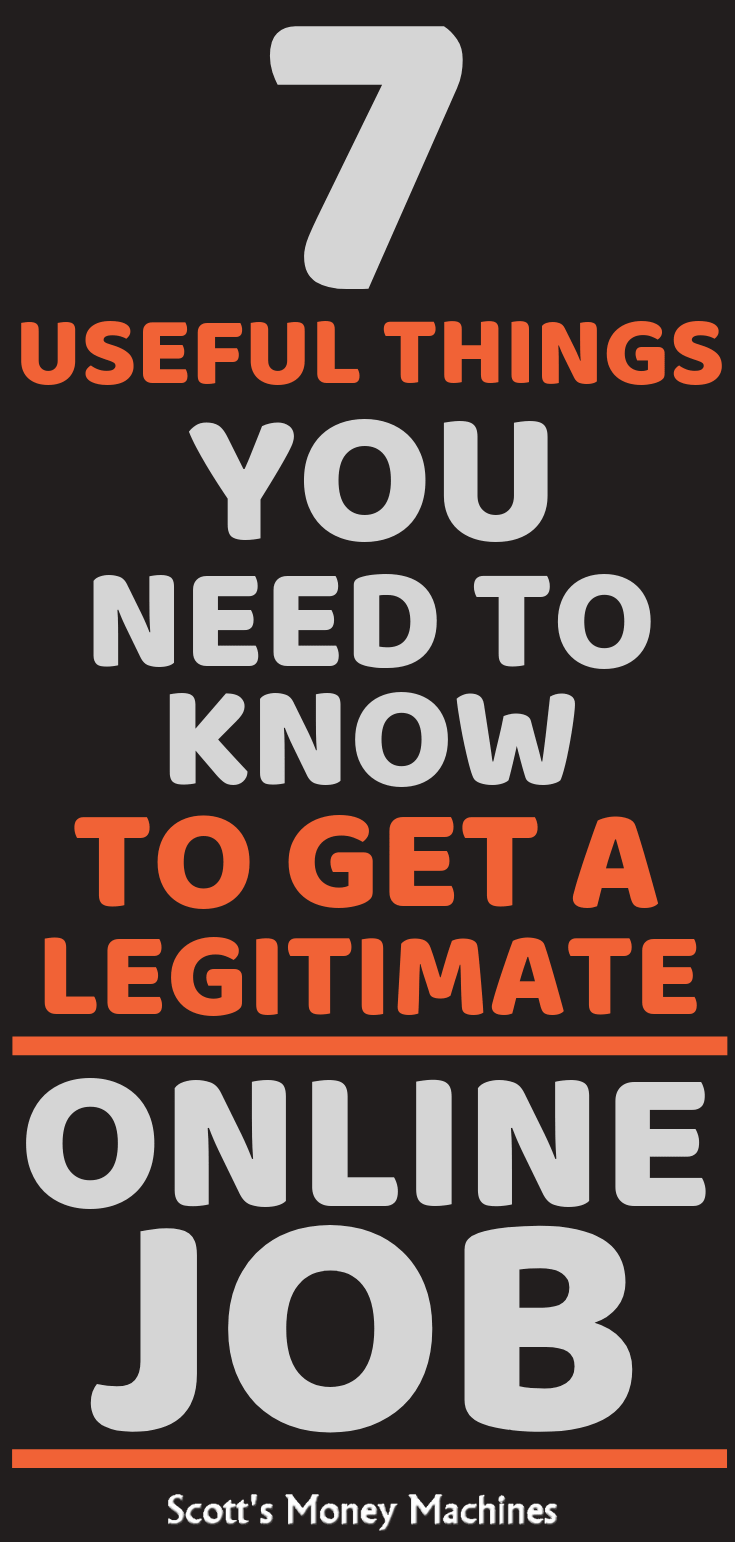Everyone has their own definition of how a flexible, work from home job can make their life better. Listen up guys! I’m going to give you the scoop on this very hot, yet contentious topic. Seems everybody wants to work from home these days, but finding legitimate opportunities are elusive at best, and a rip-off or hoax at worst. Work from home jobs are real, and I’m going to show you how to find them.

In this get-right-to-the-point post, I’m going to unravel the confusion, cut through the BS, and tell you what you need to know about remote (work from home) opportunities – including how to find them. They really do exist!
Quick Story...
I was dating a girl who works for NYU Langone Medical Center in New York City as a medical coder. Her responsibility is to code “chart” information from patient visits for billing purposes. She used to work from a cubicle all day long.
A few years back, the hospital launched a work from home experiment, and she was one of the employees chosen to participate. The pilot program was a success, and she still works from home. She no longer has to take the subway to and from work, and she no longer needs to take time to get ready in the morning. Life became much easier, creating more free time while reducing her expenses.
Why am I telling you this? It’s because I want you to know that legitimate work from home jobs are real. When I started out online, I did not know what was real, or if it was real. I really wanted to work online from home.
It’s been a long road for me, and now I do work from home (in my own business). This didn’t come easy though, because I needed to earn money while I was building my online business. Sound familiar?
Finding online gigs or work from home employment will help free up the time to focus on what you really want… whether that is to go and enjoy your newly found free time, or to work on an online business. It would have been nice to have this option at that time.
Now work from home employment is real. But it’s still in its’ infancy, and the challenge is to find legitimate work from home opportunities. I will show you how.
You have questions? It’s more than finding the work from home job, there’s a few things that are just as important that you may not have thought about. In a few minutes you will understand. Let’s get right to all of it!
We’re covering:
- What is a remote or work from home job?
- How does a remote job relate to an online business?
- Why would legit companies offer remote positions?
- What are the pros and cons of working from home?
- Is working from home a fit for me?
- How do I tell legitimate jobs opportunities from scams?
- How do I find work from home job opportunities?
1. What Is A Remote Or Work From Home Job?

Let’s start by clarifying what it means to work from home. You may have noticed that I have been using words like “work from home” as well as “remote jobs”. They are not necessarily the same.
And remote jobs can provide a real boost to your lifestyle. Working remotely includes full-time, part-time, freelance, and flexible schedule positions.
Every opportunity is different and every company is different. Some jobs require you to work from your home because they may install special equipment in your home. Others allow you to use a laptop (or other mobile device) from anywhere. Also note that some companies will provide your device, and others will require (or allow) you to use your own.
You need to keep these in mind when you begin looking for remote work. Oh yes, and the difference between work from home and remote work, is that remote work can be from anywhere, while working from home is just that – from home. Always clarify with your potential employer.
It’s also important to know that some work from home opportunities will require you work during certain pre-set hours (which may or may not be flexible), and others don’t care when you work, as long as you get the job done. There’s no “one size fits all” here.
Today’s sophisticated technology can track when you are working, what you are doing, and how productive you are. Your work from home job is still a job, and your responsibilities must be taken seriously. It’s no free ride. Remember, you are getting paid to work.
2. How Does A Remote Job Relate To An Online Business?

An online business is your own business, and a work from home job is employment by another company.
Well, sort of. I say that because there are also work from home opportunities for freelancers as well as consulting-type of opportunities.
Some companies prefer to hire freelancers, depending on the position, because it facilitates (or eliminates) the management element, and reduces and caps costs.
This means you can work remotely as a freelancer, which technically is your own business. It’s not a money machine, by my definition, because it is not a passive income.
While remote employment is a job, it still may be important for budding entrepreneurs who want a bona-fide online business. I say this because starting a business can take a great deal of time and effort before it begins to generate income (yes, even a blog can take time). As such, many people start their online business while still working a regular job. If this is the case for you, working that “regular” job from home can free up a great deal of much needed time.
I started this blog to share ways to create multiple streams of passive income (what I call “money machines”). Most people need to work a job while creating their money machines. After all, we all need food and shelter and some stability while we build our wealth. Working from home, instead of commuting to work, can be a huge benefit during this period because it saves you a ton of valuable time and money.
3. Why Would Legit Companies Offer Work From Home Positions?

At first glance, it may seem as though it would not benefit a company to provide work from home positions. People may argue that the company cannot be sure an employee is working efficiently, or even working at all. Some say they cannot properly manage their staff, the process, or the results they produce.
And while there are a few valid concerns, the benefits far outweigh the disadvantages. It’s true that not every position would be a good fit for working remotely, but many positions fit very well.
The truth is, when implemented properly, work from home initiatives save businesses a ton of money. Sure, they need to invest a bit up front in the equipment and technology to manage the productivity of their remote staff, but it quickly pay for itself. A business can save an awful lot in overhead, and choose to downsize their office or to re-allocate that space for something else that will help the company expand and grow.
By working from home, you help the company save money and resources.
4. What Are The Pros And Cons Of Working From Home?

By now you should realize that work from home (and remote) jobs are real and they exist.
You may be all pumped up and ready to find your dream work from home job, but before you jump in, I’d like to quickly review the pros and cons. It’s not all sunshine and lollipops, and there’s a few things you should know.
I’ll start with the pros, since you are probably already feeling pretty good about it. Here are the pros of working from home:
- No commute! Yep, that saves a ton of time and cost.
- No need to get ready for work. That also saves a ton of time and cost (especially if you are a woman).
- No need for a work wardrobe. Okay, you’ll probably need to have a few things for company meetings and such. But you’ll still save a whole lot.
- Lunch! Yes, that’s right… lunch. You get to choose to eat at home more economically (and perhaps healthier), or you can still choose to go out for lunch.
- Company benefits. You can still get company benefits, if your company offers them. That includes health insurance, vacation, 401k, bonuses, etc. Just keep in mind that this would not typically apply to freelancers or consultants.
- Steady paycheck. This may seem obvious, but hey, I’m pointing it out anyway.
Here’s a few more advantages that may or may not apply, depending on the position and company:
- Flexible schedules
- Flexible remote locations (work from anywhere)
- A computer or mobile device
- Expense reimbursements
Here’s the part to give some thought to. There aren’t many cons, however, they all require a strong mindset and good habits to overcome. Here are the potential disadvantages of working from home:
- Distractions. Distractions abound. They are all around you. The TV, the radio, your kids, your spouse, the phone, etc.
- Self-motivation. There’s no one looking over your shoulder. You need to provide your own motivation, and that may not be easy – especially in the beginning.
- Discipline. This kind of ties into motivation, but goes a step farther. You need to have the discipline to “be at work” on time, every time. Even if your schedule is flexible, you still need to create some kind of routine for yourself and stick to it.
If you are easily distracted, you may have a problem to overcome. Working from home is not a good fit for everyone. Remember, you are working for a company, and you can (and will) get fired if you do not perform your duties as expected.
Some people simply perform better when they are managed by someone else. It takes a great deal of responsibility and discipline to work effectively from home. It’s worth it though, if you can do it.
5. Is Working From Home A Fit For Me?

Let’s identity if working from home is truly a fit for you. We’ll answer the question: What kind of people are a natural fit for working remotely?
Do any of these describe you or appeal to you:
- Are you a stay at home mom (or dad) looking to make some extra income?
- Do you want to spend more time with the family?
- Do you want to travel and experience the world, and finance your adventures?
- Do you live in a remote or rural area, where jobs are hard to come by?
- Are you tired of your long commute?
- Are you turned-off by the 9-5 lifestyle?
- Are you a freelancer looking for a few extra gigs?
It could be for any reason, even if you are just looking for a side hustle to pay down debt. Whatever your reason, there are opportunities waiting for you so you can live on your own terms. How would that feel?
6. How Do I Tell Legitimate Jobs From Scams?

This is perhaps the issue most fear. So many of you are asking this question, and for good reason. There’s a ton of scams and rip-offs.
It’s important to know what’s real and what’s not. The best way to avoid a scam is to know how to find the legit opportunities. It’s kind of like trying to figure out how to avoid bogus gypsy cab drivers at a foreign airport. If you don’t want to get “taken for a ride” (sorry, I had do that, lol), you simply go to the registered cab area, or call an Uber.
The same is true here. The best way to avoid a rip-off is to look where everything opportunity is pre-screened. Seems simple enough, but I’d also like point out ways to spot a scam.
Here are the most common things to look out for. These things often indicate a job scam.
- The job pays a lot of money for minimal work
- The job promises quick money
- You are offered the job without them verifying your experience
- The offer seems too good to be true (you know what they say)
- They ask for personal financial info, such as a bank account or social security number, before you are hired
These traits are not exclusive to all rip-offs. Some scamsters have become clever and know how to lead you into what looks like a legit opportunity… not just for jobs, but for everything. Because they look legit, they come up in search engines, so remember to follow your gut and be careful if you go that route.
7. How Do I Find Work From Home Job Opportunities?

Generally speaking, there are three ways to find work from home jobs. They are:
- Search online (be careful here)
- Standard job sites
- Work from home specific job sites
Search Online
Everything these days typically starts with a search online. A job search is no different. The problem comes from a “work from home” job search. You can find work from home jobs by searching online, but it would be wise to avoid websites without credentials. That’s because there are people who prey upon the numbers of people who are enamored by the idea of working from home, and they often come up in these searches.
Generally, avoid searching online unless you know how to spot the bogus rip-offs. Think about the airport example above. It’s just better to go directly to the right place.
Standard Job Sites
Standard job sites are safe and secure, and the jobs are real. It’s a good option if you have extra time to sort through it all. That’s because the great majority of jobs on these sites are of the conventional type, with employment requiring you to show up and an office or job site.
Check out ZipRecruiter, and Monster. Your can search by keyword, such as “work from home”, but you’ll need to selectively sift through and review each listing individually.
You’ll do some extra work because these conventional job sites search by location, and sometimes the best work from home opportunity is nowhere near you. Major metropolitan areas often yield the most listings, so you may need to search multiple locations to uncover opportunities that are a fit for you.
Work From Home Specific Job Sites
This is the best option for most. A job site that is specifically for work from home and remote jobs has distinctive advantages. That’s because these sites are designed for people like you and me, so we can focus on the work we want, not the location. It opens up a world of opportunity because you can search regionally, nationally, and even international locations. Employers are aware of this, so the job listings they post are arranged to reach the right people (that includes you).
Remember, as mentioned, that some work from home jobs are regional, so it’s nice when the site sorts all that out for you.
To mitigate risk and ensure everything is legit, I suggest that you use a remote job site that screens employers for you. Find a job board that’s only for work from home and remote jobs and gigs. Check out FlexJobs. Their service comes with a small, flat monthly fee (not a percentage) and in return, they pre-screen every company, and vet all of the job opportunities before they can be listed.
I’ve got a promo code that gives you up to 30% off. Use promo code FLEXLIFE for an instant discount. The service is just $14.95 (month to month), and the price DROPS if you choose quarterly or annually (and that’s before the discount). If you are a freelancer looking for multiple gigs, then quarterly or annually makes a whole lot of sense. Otherwise, you probably won’t even need it more than a month or two. It’s super cost-effective to check out, especially considering the value of your time. (FlexJobs, promo code FLEXLIFE).
Here are a few (of many) resources provided by FlexJobs:
- There’s a section to research flexible companies
- They post an updated flexible job trend index
- They have notable press & awards
- They provide job search tips, skill tests, and resume help
- The have robust search options saving a ton of time
It’s worth checking out if you are serious about working remotely.
Final Words
Real, legitimate work from home and remote jobs are alive and well… you just need to know how to find them. You generally have three options:
- Search engines (just remember to be careful and follow your gut)
- Conventional job sites (they do have work from home jobs, but you’ll need to spend additional time to search and sort it all out)
- Work from home specific job sites (such as FlexJobs)
To sum it up, if you are looking for legitimate jobs, working for real companies from the comfort of your own home (or anywhere in the world), then now you know you have options.
If you do check out FlexJobs, DON’T FORGET the promo code FLEXLIFE to grab your discount off of these prices.
Resources
- Find work from home jobs on FlexJobs
- How to blog while working a regular job
- How to start a blog, cutting through the nonsense
- Formal (paid) blogging education
If you found value in this post, please share it. If you have questions, ask me!
- My Ecommerce Story Part 2 – Launching - April 28, 2020
- I’m Building An Ecommerce Store – Part 1 - April 13, 2020
- What Is A Self-Hosted Blog? - November 15, 2019